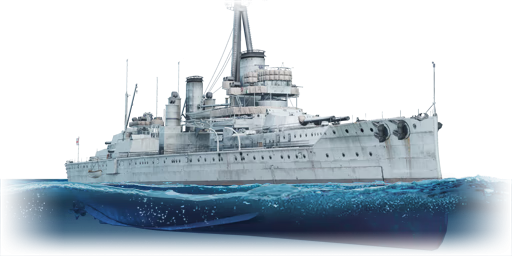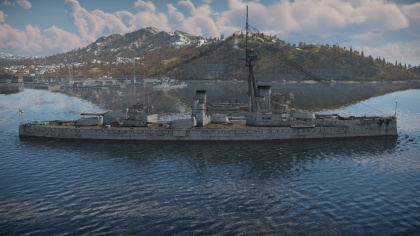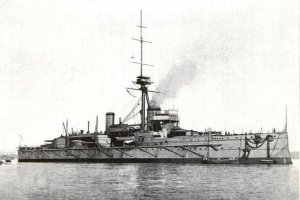Difference between revisions of "HMS Colossus"
(→History: Edits) |
(Tag: Visual edit) |
||
| Line 93: | Line 93: | ||
'''Pros:''' | '''Pros:''' | ||
| + | |||
| + | * Heavy firepower, backed up by torpedoes | ||
| + | * Well-armored | ||
* | * | ||
'''Cons:''' | '''Cons:''' | ||
| + | |||
| + | * Anti-air defense is lacking | ||
| + | * Very large profile and low mobility | ||
* | * | ||
Revision as of 16:58, 29 November 2020
Contents
Description
The Colossus-class, HMS Colossus (24), 1918 is a rank V British battleship
with a battle rating of 6.3 (AB/RB/SB). It was introduced in Update "New Power".
General info
Survivability and armour
Talk about the vehicle's armour. Note the most well-defended and most vulnerable zones, e.g. the ammo magazine. Evaluate the composition of components and assemblies responsible for movement and manoeuvrability. Evaluate the survivability of the primary and secondary armaments separately. Don't forget to mention the size of the crew, which plays an important role in fleet mechanics. Save tips on preserving survivability for the "Usage in battles" section. If necessary, use a graphical template to show the most well-protected or most vulnerable points in the armour.
Mobility
Write about the ship's mobility. Evaluate its power and manoeuvrability, rudder rerouting speed, stopping speed at full tilt, with its maximum forward and reverse speed.
| Mobility Characteristics | |||
|---|---|---|---|
| Game Mode | Upgrade Status | Maximum Speed (km/h) | |
| Forward | Reverse | ||
| AB | |||
| Upgraded | 49 | 25 | |
| RB/SB | |||
| Upgraded | 42 | 22 | |
Armament
Primary armament
Provide information about the characteristics of the primary armament. Evaluate their efficacy in battle based on their reload speed, ballistics and the capacity of their shells. Add a link to the main article about the weapon: {{main|Weapon name (calibre)}}. Broadly describe the ammunition available for the primary armament, and provide recommendations on how to use it and which ammunition to choose.
Secondary armament
Some ships are fitted with weapons of various calibres. Secondary armaments are defined as weapons chosen with the control Select secondary weapon. Evaluate the secondary armaments and give advice on how to use them. Describe the ammunition available for the secondary armament. Provide recommendations on how to use them and which ammunition to choose. Remember that any anti-air armament, even heavy calibre weapons, belong in the next section. If there is no secondary armament, remove this section.
Anti-aircraft armament
An important part of the ship's armament responsible for air defence. Anti-aircraft armament is defined by the weapon chosen with the control Select anti-aircraft weapons. Talk about the ship's anti-air cannons and machine guns, the number of guns and their positions, their effective range, and about their overall effectiveness – including against surface targets. If there are no anti-aircraft armaments, remove this section.
Torpedo armament
Torpedo launchers are standard equipment on many ships and boats. Torpedoes are a significant means of defeating an opponent. Evaluate the position of the torpedo launchers, discuss the ammunition available, firing specifics such as dead zones, features of the torpedoes themselves, etc. If there is no torpedo armament, remove this section.
Usage in battles
Describe the technique of using this ship, the characteristics of her use in a team and tips on strategy. Abstain from writing an entire guide – don't try to provide a single point of view, but give the reader food for thought. Talk about the most dangerous opponents for this vehicle and provide recommendations on fighting them. If necessary, note the specifics of playing with this vehicle in various modes (AB, RB, SB).
Modules
| Tier | Seakeeping | Unsinkability | Firepower | |||
|---|---|---|---|---|---|---|
| I | Dry-Docking | Tool Set | 305 mm Mark VIa APC | Anti-Air Armament Targeting | 4 inch CPC | |
| II | Rudder Replacement | Fire Protection System | 305 mm Mark VIIa CPC | Auxiliary Armament Targeting | ||
| III | Propeller Replacement | Shrapnel Protection | Ventilation | Primary Armament Targeting | Improved Rangefinder | |
| IV | Engine Maintenance | New Pumps | Ammo Wetting | |||
Pros and cons
Summarise and briefly evaluate the vehicle in terms of its characteristics and combat effectiveness. Mark its pros and cons in the bulleted list. Try not to use more than 6 points for each of the characteristics. Avoid using categorical definitions such as "bad", "good" and the like - use substitutions with softer forms such as "inadequate" and "effective".
Pros:
- Heavy firepower, backed up by torpedoes
- Well-armored
Cons:
- Anti-air defense is lacking
- Very large profile and low mobility
History
HMS Colossus was the lead-ship of the two-member Colossus-class, the 5th class of dreadnought battleships constructed for the Royal Navy. Named after the Colossus of Rhodes, she was launched in 1910 and commissioned in 1911. She served in training activities before the start of the First World War, and served as part of the First Battle Squadron for the majority of the war. She participated in the Battle of Jutland, and became a training ship following the war. She was hulked in 1923, and scrapped in 1928.[1][2]
Design and development
The HMS Colossus was of a similar design to the other dreadnoughts of its era. It displaced over 20 thousand tons standard and was 166 metres long;[1] similar to its predecessors, it was capable of making 21 knots (39 km/h). The Colossus was armed with a main armament of five dual 305 mm (12-inch) guns, with three mounted on the centreline and two at beam positions.[1] However, unlike the preceding dreadnoughts, one of its beam turrets faced backwards. The ship was also equipped with numerous secondary guns,[1] though its anti-aircraft guns were sparse with just a single mount. The Colossus was the last British dreadnought to carry a 12-inch main armament, as future designs switched to the more potent 13.5-inch (343 mm) guns.[1]
The HMS Colossus was ordered in 1909, and laid down in the summer of that year. It was launched in April of 1910, and completed in early 1911.[1][2]
Service history
Following her sea trials, the HMS Colossus served with the British 2nd Battle Squadron and participated in the Fleet Review of July 1912.[2] Following the start of the First World War, Colossus participated in the Battle of Jutland; she was hit by two German shells, making her the only British dreadnought to be damaged.[2] The battle was tactically inconclusive, but served as a strategic victory for the Allies as the German fleet would never sail again. In 1917, Colossus was recalled for a refit; she rejoined the British grand fleet in 1918 but the war had drawn to a close.[1] As a result, Colossus was placed into reserve as the flagship of the reserve fleet; she later served as a training ship for the Royal Navy Cadets.[2] Following the Washington naval treaty, Colossus was sold for scrapping, and was eventually scrapped in 1928.[2]
Media
Excellent additions to the article would be video guides, screenshots from the game, and photos.
See also
Links to articles on the War Thunder Wiki that you think will be useful for the reader, for example:
- reference to the series of the ship;
- links to approximate analogues of other nations and research trees.
External links
Citations
Bibliography
- Staff Writer. (2016, December 17). HMS Colossus Dreadnought Battleship. Retrieved November 28, 2020, from https://www.militaryfactory.com/ships/detail.asp?ship_id=hms-colossus-united-kingdom
- Naval Encyclopedia. (2019, March 31). Colossus Class Battleships (1909). Retrieved November 28, 2020, from https://www.naval-encyclopedia.com/ww1/UK/colossus-class
| Britain battleships | |
|---|---|
| HMS Dreadnought* | |
| Colossus-class | HMS Colossus |
| Orion-class | HMS Orion |
| Iron Duke-class | HMS Iron Duke · HMS Marlborough |
| Queen Elizabeth-class | HMS Barham |
| * Unique ship | |






